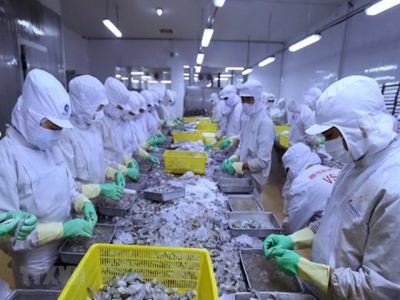Vietnams agriculture sector surpasses many goals in 2019

Hanoi - The agricultural sector has surpassed many goals in 2019, it was reported at an online conference held by the Ministry of Agriculture and Rural Development in Hanoi on December 23.
Facing trade wars and tightened regulations set by foreign markets, Vietnam has been still able to record a 41.3 billion USD turnover for agricultural and aqua-cultural products, rising 3.5 percent compared to 2018, according to the report delivered at the conference
Meanwhile, prices of these products were reduced by between 10 and 15 percent.
Besides export turnover, two other main goals that have been achieved are forestry coverage of 41.85 percent and the ratio of new rural area-certified communes of 54 percent.
This year has been difficult for the livestock industry due to continuous diseases which have caused unprecedented consequences, said minister Nguyen Xuan Cuong.
Until November, African swine fever saw 5.9 million pigs slaughtered. Hanoi alone lost 30 percent of its herd which is equivalent to 1 trillion VND (43.1 million USD).
The agriculture minister also admitted several shortcomings that hamper the growth of the sector and need to be addressed soon.
The pace of agricultural restructuring and new rural area building remain uneven between localities, and the slow progress in resolving issues related to illegal, unreported and unregulated (IUU) fishing and regaining the trust of the European Union, the risks of diseases affecting livestock and crops, and food hygiene continue to haunt the sector in 2019, Cuong said.
Against all odds, more than 2,700 new agricultural enterprises were established in 2019, increasing 25.3 percent compared to 2018 and increasing the total number of agricultural businesses to 12,581.
Seventeen major agricultural projects came into operation in 2019 with the total funding of more than 20 trillion VND (862.3 million USD), thanks to improvements in the investment environment which created motivation for investors to join the industry.
The sector’s trade surplus reached a record 9.9 billion USD, up 14 percent compared to last year. Ten commodities with export turnover of more than 1 billion USD continued to be maintained, including five product groups earning 3 billion USD which are shrimp, coffee and cashew nuts.
Prime Minister Nguyen Xuan Phuc hailed the sector for its achievements in 2019 despite difficult conditions, saying it needs to continue to respond to climate change, apply technology in agricultural production and improve quality of human resources.
He also urged the sector to improve its production quality and expand markets to other countries, especially the EU, next year.
The PM asked the ministry to build a modern, globally-integrated and sustainable agricultural sector along with new rural areas.
“To achieve the target of 2.8 to 3 percent of GDP growth, the sector should take advantage of tropical agriculture and develop high-quality specialised areas with products meeting food safety requirements,” he said.
Minister Cuong said in 2020, the ministry expects to accelerate the connection between raw material areas with food processing factories and logistics systems to expand export markets and link with the global value chain.
The ministry plans to choose "locomotive" enterprises which possess strong financial and technical capacity and market accessibility to efficiently lead value chains.
The legislative reform needs to be continued to cut red tape and offer assistance policies and proper legal frameworks to promote land accumulation for large-scale, industrial agricultural production.
The Government expects to submit the amended land law to the National Assembly for approval in 2020 to achieve this goal, he said.
Cuong stressed the significance of 2020 as the due date of the five-year plan from 2016 to 2020 which aims to boost the sector’s GDP growth from 2.8 to 3 percent and the export turnover of more than 42 billion USD.
Có thể bạn quan tâm
 Vegetables, fruits exports post good growth
Vegetables, fruits exports post good growth Export of vegetables and fruits is one of the sectors with high growths of Vietnamese agriculture with a growth of 26 percent per annum.
 Stronger links between firms, farmers bolster agriculture in Bac Ninh
Stronger links between firms, farmers bolster agriculture in Bac Ninh Stronger links between farmers and businesses have raised agricultural production value and income for people in the northern province of Bac Ninh.
 Farm-based economy contributes to new rural area building in Bac Ninh
Farm-based economy contributes to new rural area building in Bac Ninh Developing a farm-based economy with mass production has been defined as a key task by localities in the Red River Delta province of Bac Ninh as they look